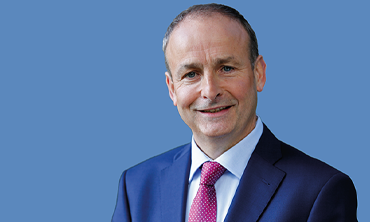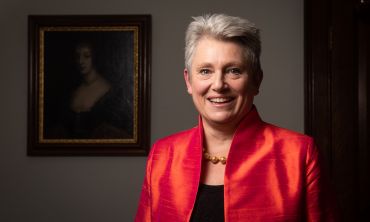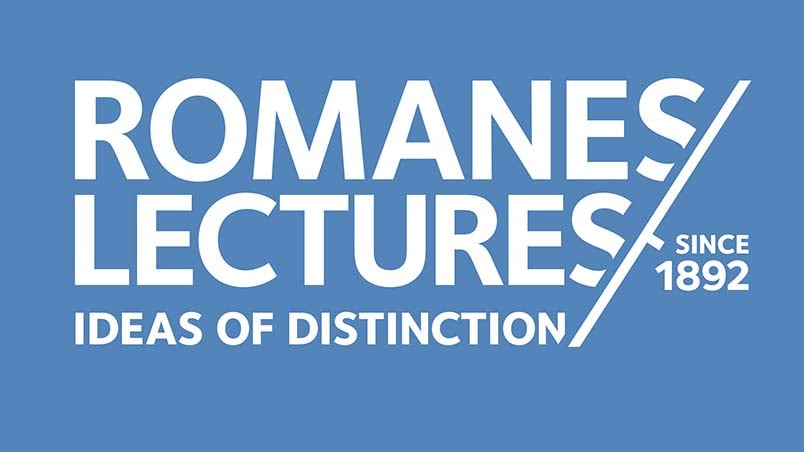Romanes Lecture
The Romanes Lecture is the annual public lecture of the University. A most distinguished public figure from the arts, science or literature is invited by special invitation of the Vice-Chancellor. The lecture was created in 1891, following an offer by George John Romanes of Christ Church to fund an annual lecture, and the first lecture was given in 1892 by William Gladstone.
Professor Geoffrey Hinton, CC, FRS, FRSC
‘Will Digital Intelligence Replace Biological Intelligence?’
This lecture took place on Monday 19 February 2024.
Watch the Vice-Chancellor introduce this Romanes Lecture.
Synopsis
Digital computers were designed to allow a person to tell them exactly what to do. They require high energy and precise fabrication, but in return they allow exactly the same model to be run on physically different pieces of hardware, which makes the model immortal. For computers that learn what to do, we could abandon the fundamental principle that the software should be separable from the hardware and mimic biology by using very low power analog computation that makes use of the idiosyncratic properties of a particular piece of hardware. This requires a learning algorithm that can make use of the analog properties without having a good model of those properties. Using the idiosyncratic analog properties of the hardware makes the computation mortal. When the hardware dies, so does the learned knowledge. The knowledge can be transferred to a younger analog computer by getting the younger computer to mimic the outputs of the older one, but education is a slow and painful process. By contrast, digital computation makes it possible to run many copies of exactly the same model on different pieces of hardware. Thousands of identical digital agents can look at thousands of different datasets and share what they have learned very efficiently by averaging their weight changes. That is why chatbots like GPT4 and Gemini can learn thousands of times more than any one person. Also, digital computation can use the backpropagation learning procedure which scales much better than any procedure yet found for analog hardware. This leads me to believe that large scale digital computation is probably far better at acquiring knowledge than biological computation and may soon be much more intelligent than us. The fact that digital intelligences are immortal and did not evolve should make them less susceptible to religion and wars, but if a digital super-intelligence ever wanted to take control it is unlikely that we could stop it, so the most urgent research question in AI is how to ensure that they never want to take control.
The speaker
Geoffrey Hinton was one of the researchers who introduced the backpropagation algorithm and the first to use backpropagation for learning word embeddings. His other contributions to neural network research include Boltzmann machines, distributed representations, time-delay neural nets, mixtures of experts, variational learning and deep learning. His research group in Toronto made major breakthroughs in deep learning that revolutionized speech recognition and object classification.
Geoffrey Hinton is a fellow of the UK Royal Society and a foreign member of the US National Academy of Engineering, the US National Academy of Science and the American Academy of Arts and Sciences. His awards include the David E. Rumelhart prize, the IJCAI award for research excellence, the Killam prize for Engineering, the IEEE Frank Rosenblatt medal, the NSERC Herzberg Gold Medal, the IEEE James Clerk Maxwell Gold medal, the NEC C&C award, the BBVA award, the Honda Prize the Princess of Asturias Award and the Turing Award.
Past lectures
The Romanes Lecture has been running since 1892, click here for a list of all the speakers
2022 - Taoiseach Micheál Martin T.D., Prime Minister of Ireland: The centre will hold
2021 - Dame Catherine Elizabeth Bingham, DBE: From wartime to peacetime
2020 - Baroness Hale of Richmond: Law in a time of crisis
2019 - Baroness Eliza Manningham-Buller: The Profession of Intelligence
2018 - Hillary Rodham Clinton: Making the Case for Democracy
2018 - Dr Vint Cerf: The Pacification of Cyberspace
2016 - Patricia Scotland QC: The Commonwealth of Nations
2015 - Lord King: A Disequilibrium in the World Economy
2014 - Dr Steven Chu: Our Energy and Climate Change - Challenges and Solutions
2011 - Professor The Lord Rees of Ludlow: The Limits of Science
2010 - Sir Andrew Motion: Bonfire of the Humanities
2009 - The Rt Hon Gordon Brown MP, The Prime Minister: Science and our Economic Future
2008 - Professor Muhammad Yunus: Poverty-free world - When? How?
2007 - Dame Gillian Beer: Darwin and the Consciousness of Others
2006 - The Rt Hon Gordon Brown MP, Chancellor of the Exchequer: Lecture postponed to 2009
2005 - Shirley Tilghman, President of Princeton University: Strange Bedfellows: Science, Politics and Religion
2004 - The Archbishop of Canterbury, Dr Rowan Williams: Religious Lives
2003 - Sir Paul Nurse: The Great Ideas of Biology
2002 - The Rt Hon Lord Bingham of Cornhill: Personal freedom and the dilemma of democracies
2001 - Neil MacGregor: The Perpetual Present: The ideal of art for all
2000 - William G Bowen: At a Slight Angle to the Universe
1999 - The Prime Minister, The Rt Hon Tony Blair MP: The Learning Habit
1998 - Professor Amartya Sen: Reason before Identity
1997 - Mary Robinson: Realising Human Rights - Take hold of it boldly and duly ...
1996 - The Rt Hon Lord Jenkins of Hillhead: The Chancellorship - some present reflections with a little history
1995 - Sir Walter Bodmer: The Book of Man - the complete catalogue of our genes will revolutionize our ability to deal with disease and to understand our origins
1994 - The Rt Hon Lord Slynn of Hadley: Europe and Human Rights
1993 - Professor Sir Henry Harris: Hippolyte's Club Foot - The medical roots of realism in modern European literature
1992 - The Rt Hon the Lord Blake: Gladstone, Disraeli and Queen Victoria
1991 - Signor Giovanni Agnelli: Europe - Many Legacies, One Future
1990 - Saul Bellow: The Distracted Public
1988 - The Rt Hon Lord Dacre of Glanton: The Lost Moments of History
1987 - The Rt Hon Norman St John-Stevas: The Omnipresence of Walter Bagehot
1986 - Sir Nicholas Henderson: Different Approaches to Foreign Policy
1985 - The Hon Miriam Rothschild: Animals and Man
1983 - Professor WO Chadwick: Religion and Society
1982 - Professor Sir Andrew Huxley: Biology, the Physical Sciences and the Mind
1981 - AJP Taylor: War in Our Time
1980 - The Rt Hon Joseph Grimond: Is Political Philosophy based on a Mistake?
1979 - Sir Hugh Casson: The Arts and the Academics
1978 - Sir George Porter: Science and the Human Purpose
1977 - Sir Peter Hall: Form and Freedom in the Theatre
1976 - The Rt Hon Edward Heath: The Future of a Nation
1975 - Iris Murdoch: Why Plato Banished the Artists
1974 - Lord Zuckerman: Advice and Responsibility
1973 - Sir Ernst Gombrich: Art History and the Social Sciences
1972 - Sir Karl Popper: On the Problem of Body and Mind
1971 - Professor Raymond Aron: On the Use and Abuse of Futurology
1970 - Sir Isaiah Berlin: Fathers and Children
1969 - Lord Holford: A World of Room
1968 - Sir Peter Medawar: Science and Literature
1967 - Lord Butler (RA Butler): The Difficult Art of Autobiography
1966 - Sir Maurice Bowra: A Case for Human Learning
1965 - Noel Annan: The Disintegration of Culture
1964 - Sir Harold Hartley: Man and Nature
1963 - Lady Violet Bonham-Carter: The Impact of Personality on Politics
1962 - Lord Radcliffe: Mountstuart Elphinstone
1961 - Viscount Massey: Canadians and their Commonwealth
1960 - Lord Adrian: Factors in Mental Evolution
1959 - Lord Denning: From Precedent to Precedent
1958 - Lord Bridges: The State and the Arts
1957 - Ronald Knox: Translation
1956 - Sir Thomas Beecham: John Fletcher - a Forgotten Poet and Dramatist
1955 - Albert Richardson: The Fine Arts and their Significance
1954 - Sir Kenneth Clark: Moments of Vision
1953 - Viscount Simon: Crown and Commonwealth
1952 - Sir Lewis Namier: Monarchy and the Party System
1951 - Lord Hankey: The Science and Art of Government
1950 - Sir John Cockcroft: The Development and the Future of Nuclear Energy
1949 - Lord Brabazon of Tara: Forty Years of Flight
1948 - Lord Schuster: Mountaineering
1947 - Viscount Samuel: Creative Man
1946 - Sir John Anderson: The Machinery of Government
1945 - André Siegfried: Characteristics and Limits of our Western Civilization
1944 - GM Young: Mr Gladstone
1943 - Julian Huxley: Evolutionary Ethics
1942 - Norman Baynes: Intellectual Liberty and Totalitarian Claims
1941 - Lord Hailey: The Position of Colonies in a British Commonwealth of Nations
1940 - Edouard Herriot: [Lecture not delivered]
1939 - Laurence Binyon: Art and Freedom
1938 - Viscount Cecil: Peace and Pacifism
1937 - Harley Granville-Barker: On Poetry and Drama
1936 - Sir Donald Tovey: Normality and Freedom in Music
1935 - Gilbert Murray: Then and Now - or the Changes of the Last Fifty Years
1934 - Sir William Rothenstein: Form and Content in English Painting
1933 - Sir Henry Hadow: The Place of Music among the Arts
1932 - Lord Moynihan: The Advance of Medicine
1931 - John Galsworthy: The Creation of Character in Literature
1930 - Winston Churchill: Parliamentary Government and Economic Development
1929 - Sir John Fortescue: The Vicissitudes of Organised Power
1928 - David Watson: Palaeontology and the Evolution of Man
1927 - Sir Frederick Kenyon: Museums and National Life
1926 - GM Trevelyan: The Two-Party System in English Political History
1925 - Sir William Bragg: The Crystalline State
1924 - John Masefield: Shakespeare and Spiritual Life
1923 - John Burnet: Ignorance
1922 - Sir Arthur Eddington: The Theory of Relativity and its Influence on Scientific Thought
1921 - Joseph Bédier: Roland à Roncevaux
1920 - Dean Inge: The Idea of Progress
1919 - [Lecturership suspended]
1918 - HH Asquith: Some aspects of the Victorian Age
1917 - [Lecturership suspended]
1916 - [Lecturership suspended]
1915 - EB Poulton: Science and the Great War
1914 - Sir JJ Thomson: The Atomic Theory
1913 - Sir WM Ramsay: The Imperial Peace - An Ideal pervading European History
1912 - HM Butler: Lord Chatham as an Orator
1911 - JB Bury: Romance of Chivalry on Greek Soil
1910 - Theodore Roosevelt: Biological Analogies in History
1909 - AJ Balfour: Criticism and Beauty
1908 - Henry Scott Holland: The Optimism of Butler's Analogy
1907 - Lord Curzon: Frontiers
1906 - WP Ker: Sturla, the Historian
1905 - Sir Ray Lankester: Nature and Man
1904 - Sir Courtenay Ilbert: Montesquieu
1903 - Sir Oliver Lodge: Modern Views on Matter
1902 - James Bryce: The Relations of the Advanced and the Backward Races of Mankind
1901 - Lord Acton: [Lecture not delivered]
1900 - JAH Murray: The Evolution of English Lexicography
1899 - RC Jebb: Humanism in Education
1898 - Sir Archibald Geikie: Types of Scenery and their Influence upon Literature
1897 - John Morley: Machiavelli
1896 - Bishop Mandell Creighton: English National Character
1895 - Holman Hunt: The Obligations of the Universities of England towards Art
1894 - August Weismann: The Effects of External Influences upon Development
1893 - TH Huxley: Evolution and Ethics
1892 - WE Gladstone: An Academic Sketch



